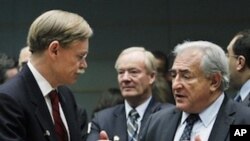The International Monetary Fund concluded two days of talks in Washington Saturday without reaching a solution to address rising tensions about currency exchange rates. Meanwhile, the World Bank says it does not believe these issues will overshadow talk of development at next month's G-20 meeting.
A communiqué issued Saturday at the conclusion of the International Monetary Fund meetings says the IMF pledges to "deepen its work" in areas including global imbalances and exchange rate movements.
Speaking to reporters at the conclusion of talks, IMF Managing Director Dominique Strauss-Kahn said he believes that global leaders are discussing the right issues. But, he said, talk is not as effective as adopting policy. "There is no way to believe that global growth could be rebalanced without changing some currency value because it's clear that we're going to have high growth in one part of the world and low growth in another part of the world. The rebalancing goes also through the revaluation of the part of the world where you have high growth," he said.
A cheaper currency gives a nation an edge because its goods have a price advantage on the international market, while it makes goods imported into that nation more expensive.
While global finance leaders could not agree on a new strategy, the chairman of the IMF, Egyptian Finance Minister Youssef Boutros-Ghali, said members did agree that the IMF should play a major role in addressing currency disputes.
Talk of currency disputes and the need for structural rebalance dominated the talks in Washington, as did a push to implement reforms. The IMF's final communiqué said that further action is needed to enhance regulation and supervision. And Boutros-Ghali said multilateral surveillance is increasingly necessary as economies become more and more integrated.
Those topics perhaps overshadowed the fact that the IMF says the economic recovery is proceeding, even though it remains fragile and uneven.
Later Saturday, at the World Bank's Development Committee press conference, World Bank chief Robert Zoellick said he is not worried that the debates of these meetings will overshadow talk of development at next month's G-20 gathering in Seoul, South Korea. "The big story is the emerging markets are driving the growth, and these are the developing countries. So I think the key point about development is that it is not only a category to be put to the side -- it's one of the driving engines to have a successful international growth prospect and recovery," he said.
Strauss-Kahn agreed, saying currency and imbalance issues are not separate from development issues.
Zoellick also said a lack of support for the International Development Association (IDA) to fund the poorest 79 countries would devastate efforts to achieve the Millennium Development Goals. He said the World Bank Development Fund is asking former beneficiaries to accelerate payments and emerging donors to contribute to reflect their growing economic weight.
"With a robust IDA replenishment we could immunize 200 million more children; extend health services to over 30 million more people; give access to improved water sources to 80 million more people; help build 80,000 kilometers of roads, and train and recruit over 2 million more teachers," he said.
The development fund's deputies are set to meet Monday in Washington.
IMF Meetings End Without Resolution to Currency Crisis




